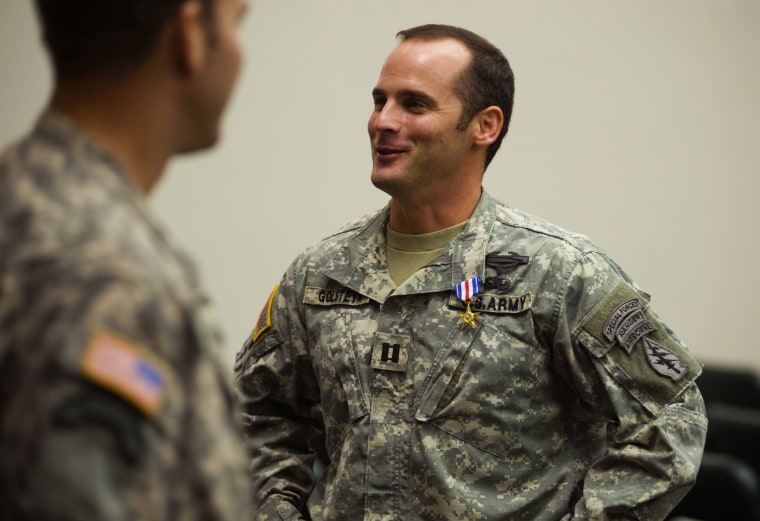President Donald Trump’s announcement on Twitter over the weekend that he will be "reviewing" the case of a former Army Green Beret charged with murder has caused worry in national security and military circles — since it is the kind of thing a president is not supposed to do.
On Thursday, Maj. Mathew Golsteyn, was charged with premeditated murder in the 2010 killing of an alleged Afghan bomb maker.
According to all sides involved, Golsteyn first admitted to the killing during a CIA job interview in 2011, which triggered an investigation by the Army Criminal Investigation Command, or CID.
Golsteyn was not initially charged with a crime because of a lack of physical evidence, but he was issued a formal reprimand and stripped of his Silver Star, the military's third-highest award for valor, and his Special Forces patch.
Now that the probe has been rekindled in a military court, Golsteyn faces a maximum penalty of death.
Golsteyn told NBC News on Monday that he believes his case came under renewed scrutiny after he spoke of the incident in an October 2016 Fox News interview.
And Golsteyn seemed to catch the president’s attention after a segment about the case aired on the weekend edition of "Fox & Friends" — Trump even tagged Fox News' Pete Hegseth and Fox News in his tweet about Golsteyn.
But Trump’s actions are worrying national security experts, who fear presidential involvement in a still-pending military court case will make it harder to have a fair trial.
Rachel VanLandingham, the former chief of international law with U.S. Central Command under Presidents George W. Bush and Barack Obama, and now a professor at Southwestern Law School, told NBC News that Trump, as commander in chief, has "an obligation to ensure a fair administration of military justice."
To do this, VanLandingham said, the president cannot pressure lower-level commanders to make decisions, which she believes the president did in his tweet on Sunday.
Dr. Karen Greenberg, director of Fordham Law School’s Center for National Security, agreed, telling NBC News “It’s inappropriate for the executive [branch] to interfere.”
While Trump is well within his rights to look into any military case, pending or complete, it is specifically his public announcement so early in the court proceedings that is drawing concern. A date for the initial hearing in Golsteyn’s case has yet to be set, and a decision to prosecute has not been made.
U.S. law requires that the Army fully investigate any and every allegation of a war crime. Trump could legally pardon Golsteyn even before the case goes through the military court, but some see this as a rebuke to the rule of law and an indifference to the judicial system.
VanLandingham noted that the president's tweet "puts the Army in a hard spot because it misunderstands that the Army is doing its job."
Presidents have issued pre-emptive pardons have been used in the past, such as President Gerald Ford for his predecessor Richard Nixon in the Watergate scandal.
Maj. Gen. Charles J. Dunlap Jr., a professor and the executive director at the Center on Law, Ethics and National Security at Duke University Law School, told NBC News via email Tuesday that other examples include President Abraham Lincoln reviewing "more than 1,600 military justice cases during the Civil War," and President Franklin D. Roosevelt ordering that "Nazi saboteurs [be] tried by a military commission instead of a civilian court even through one of the accused was a U.S. citizen."
Dunlap said "the closest modern example" that he could recall was Nixon's involvement in the Calley case, when William Calley Jr., an officer in the U.S. Army, was convicted of murdering unarmed South Vietnamese civilians in the March 1968 My Lai Massacre.
Despite such precedent, Greenberg stressed that "for the most just outcome, what you want is the judicial system — whether they’re inside the military or whether they’re inside the federal court system — to operate independently."
"To interfere in the charging or other procedural part of the military trial would be unacceptable," Greenberg said. She added that Trump's tweet is "one more sign of the president’s disregard for the courts, and their presumed independence from White House interference."
While Golsteyn himself told NBC News on Tuesday that he feels like he is being unfairly targeted, his wife, Julie Golsteyn, seems uninterested in the president’s help.
On the "Today" show Tuesday, while asserting her husband's innocence, she said, "This is not a situation where Matt did something wrong and now we need some strings pulled."
VanLandingham told NBC News that her worries about the president’s Sunday Twitter post extend beyond this specific case.
"If you don’t have rules about how you’re going to engage in conduct on the battlefield, discipline breaks down and you have massive reckless destruction."
Dunlap, however, stressed there is another way to view the president’s tweet. Oversight, he noted in an email, is an "important incident of civilian control of the military." Further, “transparency — via Twitter or otherwise — can operate to reinforce the legitimacy of the military justice system.”
Presidential legal authority, Dunlap emphasized, can be “a bulwark against the potential abuse of the rights of those in uniform" and "temper — when appropriate — the application of military justice system."
Whatever the result of Golsteyn’s case, VanLandingham emphasized that it should go through the courts before the president weighs in.
"If you just let soldiers to kill whomever they want, whenever they want to, violence begets violence," she said. "That’s war in a nutshell."
CORRECTION (Dec. 19, 11:35 a.m. ET): An earlier version of this article misspelled the first name of a former Green Beret charged with murder in the 2010 death of a suspected Afghan bomb maker. He is Maj. Mathew Golsteyn, not Matthew.


